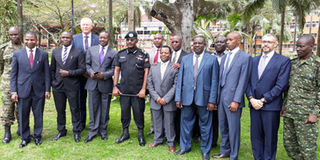Experts agree on 12 resolutions to fight terrorism in Great Lakes region

John Ndungutse, the director Counter terrorism Unit of the Police (c), posses for a group photograph with other counter terrorism bosses from across the Great Lakes region in Entebbe at the weekend. The team of experts came up with 12 resolutions to help them jointly fight the increasing trend of terrorism in the region. Photo by Anthony Wesaka.
What you need to know:
The workshop was attended by counter terrorism experts from most of the Great Lakes region member states and officials from UN, African Center on research on terrorism
ENTEBBE.
Counter terrorism experts across the Great Lakes region have come up with 12 resolutions that they believe if implemented by each member state, will be key in fighting the growing trend of terrorism and violet extremism in the region.
The resolution to come up with a counter terrorism strategy to fight terrorism was hatched at the end of the two-day workshop held in Entebbe over the weekend
The experts from the region were meeting to strategise on how to fight the increasing trend of terror attacks in the Great Lakes region since terrorism doesn’t know boarders and yet the region has no strategy to prevent or fight the extremists.
The workshop was attended by counter terrorism experts from most of the Great Lakes region member states and officials from UN, African Center on research on terrorism.
Countries that form the Great Lakes Region include; Angola, Burundi, DRC, Congo, Central African Republic, Kenya, Sudan, South Sudan, Tanzania, Rwanda, Uganda and Zambia.
Some of the resolutions that the counter terrorism experts agreed upon in fight against terrorism include; coordinated, joint investigation and interrogation of suspected terrorists, harmonization of laws in addressing terrorism activities like arrests, detention, prosecution, conviction and punishment, protection of witnesses and prosecution lawyers, and the regional arrest warrant for the suspected terrorists and their extradition for trial.
Other resolutions agreed upon were; each member state to address social economic conditions pull and push factors including but not limited to; poverty eradication, employment opportunities for the youth, rule of law and respect for human rights, eradication of corruption, political inclusion and embracing and sticking to good government practices, timely sharing of early warning information between member states and law enforcement agencies.
Friday’s workshop concludes the drafting phase of the counter terrorism strategy that stated a year ago.
Mr Wilson Kajwengye, the Director Peace and Security of International Conference on the Great Lakes Region, at the end of the two-day workshop, revealed that the next phase in realization of these 12 resolutions that were agreed upon is to hold a consultative meeting with relevant stake holders.
Mr Kajwengye added the last stage of implementation of these 12 agreed upon resolutions will be the approval stage where all the heads of the Great Lakes region member states will adopt the resolutions officially.
He said the last stage is expected to finalised at the end of this year.
UTILITY
12 Resolutions agreed upon by Great Lakes region member states to fight terrorism and violent extremism.
· Harmonization of Laws addressing terrorism, their arrest, detention, prosecution, conviction and punishment;
· Protection of witnesses and prosecution lawyers;
· Regional arrest warrant for the suspected terrorists and their extradition for trial;
· Coordinated, joint investigation and interrogation of suspected terrorists;
· Each Member State to address social economic conditions pull and push factors including but not limited to; poverty eradication, employment opportunities for the youth, rule of law and respect for human rights, eradication of corruption, political inclusion and embracing and sticking to good government practices;
· Timely sharing of early warning information between Member States and law enforcement agencies;
· Establishing and maintaining a regional database of suspected terrorists;
· Continuous research and knowledge sharing among Member States;
· Strategic monitoring of the internet and related social media;
· Continuous training and capacity building of experts dealing with Counterterrorism in the Great Lakes region;
· Partnership with the media, civil society, religious organizations and the private sector in the fight against terrorism, radicalization, mercenary phenomenon and violent extremism in the Great Lakes region;
· Ratification and Implementation of relevant International and continental Instruments that address terrorism radicalization and extreme violence.




